Opera
- The Twelve Chairs (Shostakovich), an unfinished operetta by Dmitri Shostakovich
The Twelve Chairs is a 1928 satirical novel by Soviet authors Ilya Ilf and Yevgeny Petrov.
The Twelve Chairs may also refer to:
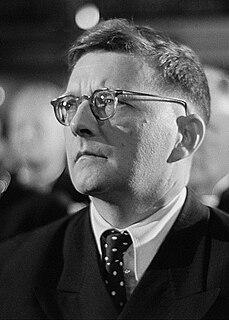
Dmitri Dmitriyevich Shostakovich was a Soviet-era Russian composer and pianist. He became internationally famous upon the premiere of his First Symphony in 1926 and was regarded throughout his life as one of the major composers of the 20th century.
The year 2002 in film involved some significant events.

Tikhon Nikolayevich Khrennikov was a Russian and Soviet composer, pianist, and leader of the Union of Soviet Composers, who was also known for his political activities. He wrote three symphonies, four piano concertos, two violin concertos, two cello concertos, operas, operettas, ballets, chamber music, incidental music and film music.

Dmitri Shostakovich’s Symphony No. 7 in C major, Op. 60, nicknamed the Leningrad, was begun in Leningrad, completed in the city of Samara in December 1941, and premiered in that city on March 5, 1942. At first dedicated to Lenin, it was eventually submitted in honor of the besieged city of Leningrad, where it was first played under dire circumstances on August 9, 1942, nearly a year into the siege by German and Finnish forces. The performance was broadcast by loudspeaker throughout the city and to the German forces in a show of resilience and defiance. The Leningrad soon became popular in both the Soviet Union and the West as a symbol of resistance to fascism and totalitarianism, thanks in part to the composer's microfilming of the score in Samara and its clandestine delivery, via Tehran and Cairo, to New York, where Arturo Toscanini led a broadcast performance and Time magazine placed Shostakovich on its cover. That popularity faded somewhat after 1945, but the work is still regarded as a major musical testament to the 27 million Soviet people who lost their lives in World War II, and it is often played at Leningrad Cemetery, where half a million victims of the 900-day Siege of Leningrad are buried.

Lenfilm is a Russian production company with its own film studio located in Saint Petersburg. It is a corporation with its stakes shared between private owners and several private film studios which operate on the premises. Since October 2012, the Chairman of the board of directors is Fyodor Bondarchuk.
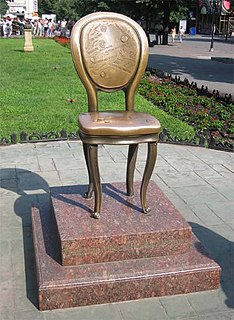
The Twelve Chairs is a classic satirical novel by the Odessan Soviet authors Ilf and Petrov, published in 1928. Its plot follows characters attempting to obtain jewelry hidden in a chair. A sequel was published in 1931. The novel has been adapted to other media, primarily film.
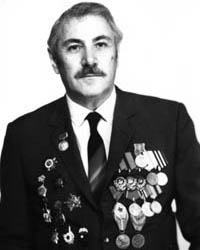
Grigory Naumovich Chukhray was a Ukrainian Soviet and Russian film director and screenwriter. People's Artist of the USSR (1981). He's the father of the Russian film director Pavel Chukhray.

Mieczysław Weinberg was a Jewish composer from Poland who resided in the USSR. Ever since a revival concert series in the 2010 Bregenz Festival in Austria, his music has been increasingly described as "some of the most individual and compelling music of the twentieth century". Weinberg's output was extensive, encompassing 26 symphonies, 17 string quartets, nearly 30 sonatas for various instruments, 7 operas, and numerous film scores.
Seawolf, Sea wolf or Sea Wolves may refer to:

The Twelve Chairs is a 1970 American comedy film directed and written by Mel Brooks and starring Frank Langella, Ron Moody, and Dom DeLuise. The film was one of at least 18 film adaptations of the Russian 1928 novel The Twelve Chairs by Ilf and Petrov.

The cinema of Russia began in the Russian Empire, widely developed in the Soviet Union and in the years following its dissolution, the Russian film industry would remain internationally recognized. In the 21st century, Russian cinema has become known internationally with films such as Hardcore Henry (2015), Leviathan (2014), Night Watch (2004) and Brother (1997). The Moscow International Film Festival began in Moscow in 1935. The Nika Award is the main annual national film award in Russia. The 2022 Russian invasion of Ukraine has impacted Russian cinema, as it became subjected to a number of boycotts and bans.
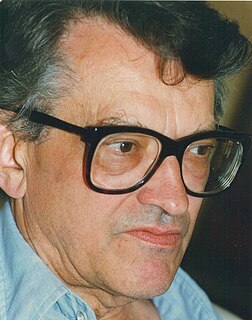
Vojtěch Jasný was a Czech director, screenwriter and professor who has written and directed over 50 films. Jasný made feature and documentary films in Czechoslovakia, Germany, Austria, USA & Canada, and was a notable figure in the Czechoslovak New Wave movement of the 1960s. He is best remembered for his movies The Cassandra Cat and All My Compatriots, both of which won prizes at Cannes Film Festival. In addition to his film career he taught directing at film schools in Salzburg, Vienna, Münich and New York.

Ulrike Ottinger is a German filmmaker and photographer.
There have been at least 30 film adaptations of Fyodor Dostoyevsky's 1866 novel Crime and Punishment.

Isaac Iosifovich Schwartz, also known as Isaak Shvarts, was a Soviet composer.

The Twelve Chairs is a 1976 four episode musical television film directed by Mark Zakharov based on the 1928 novel of the same name by Ilf and Petrov.
The Gamblers may refer to:

The Leningrad première of Shostakovich's Symphony No. 7 took place on 9 August 1942 during the Second World War, while the city of Leningrad was under siege by Nazi German forces.
The Twelve Chairs is an unfinished operetta by Dmitri Shostakovich based on the 1928 novel The Twelve Chairs by Ilf and Petrov. Shostakovich announced the work in July 1939, for the Leningrad Theater of Musical Comedy. In October that year, he assumed he would be finished with the operetta at the end of that year, but he never finished the work.
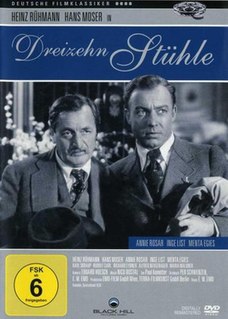
Thirteen Chairs is a 1938 German comedy film directed by E. W. Emo and starring Heinz Rühmann, Hans Moser and Inge List. It is based on the 1928 novel The Twelve Chairs by Ilf and Petrov, one of numerous adaptations of the work.